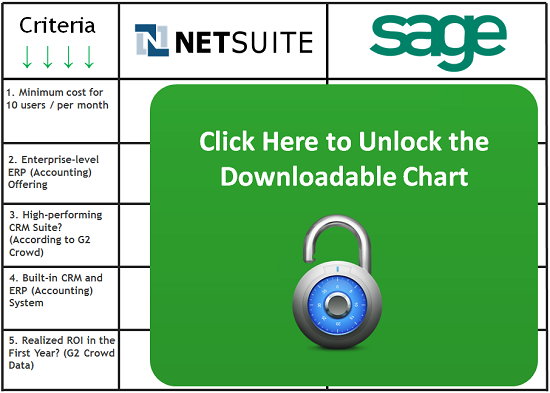NetSuite Vs. Sage ERP — Cloud Vs. On-premise
1. NetSuite (Cloud) vs. Sage ERP (On-premise) —
Cloud vs. on-premise deployment is the first big difference between NetSuite versus Sage ERP accounting software. NetSuite is always deployed in the cloud, meaning you subscribe and log into a website to use the software. Sage ERP (Sage 100, 300, etc.) on the other hand, is hosted primarily on-premise, meaning that most of the time it is owned and hosted by the end user. For a full NetSuite vs. Sage comparison guide, download our comparison chart.
It’s important to know that your data will be hosted on NetSuite’s cloud, which is highly secure. You can also safely host Sage on-premise, and there is also a cloud option available. Although Sage is primarily deployed on-premise (83% of Sage users are on-premise), a cloud option for both Sage 100 and Sage 300 is available, but not as common. For the purposes of this blog and white paper, we will be comparing Sage as an on-premise product.
2. Unlike Sage, NetSuite aims to not just be an ERP / accounting platform —
NetSuite and Sage are both modern ERP/accounting software platforms. That being said, another key difference between NetSuite versus Sage ERP is that NetSuite aims to not only be an enterprise-level accounting platform, but also an equally adept CRM system. This means that you can use NetSuite not only as an accounting, inventory and payroll platform, but also a customer database and integration-friendly marketing tool. In order to get the same functionality out of Sage, you would have to integrate a third-party CRM.
It’s important to note that just because NetSuite has a CRM, doesn’t mean that it is any “better” than a third-party CRM tool. For more differences between NetSuite ERP vs. CRM products, check out our NetSuite vs. Salesforce blog.
3. How do you know if it’s time to move into an ERP platform? Is NetSuite or Sage right for me? —
If you find yourself using a program like QuickBooks to write checks and create invoices, yet find yourself using a separate program for payroll or forecasting, you may want to consider an ERP system like NetSuite or Sage 100 or 300 ERP. True “ERP” (enterprise resource planning) software is capable of many more accounting features than typical accounting software like QuickBooks. Of course, all this functionality comes at a higher price.
4. License Costs —
When comparing NetSuite vs. Sage, it’s also important to know the licensing differences. If you host Sage ERP on-premise, you’ll own the software outright, but you’ll be subjected to a higher upfront cost to purchase the software. The only recurring cost you would then pay for Sage is for support (starting at 21% of your license costs/per year), meanwhile, NetSuite is purely hosted in the cloud, meaning you won’t have to pay for the software outright.
NetSuite will be cheaper than Sage ERP upfront, but you may have a higher month-to-month recurring cost than you would with Sage support for on-premise applications. To find out how much each solution costs per year and which one is right for you, download the chart below.
5. Download our Full NetSuite vs. Sage ERP PDF Guide:
Stay in the Loop
Subscribe to get all our latest content sent directly to your inbox!






